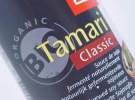Shoyu
 Shoyu is a soy sauce, which is a dark brown liquid made from soya beans that have undergone a fermentation process. Natural shoyu employs the use of a centuries-old method of fermentation involving a special koji (Aspergillus oryzae), which converts hard-to-digest soy proteins, starches and fats into easily absorbed amino acids, simple sugars and fatty acids. Most commercial shoyu is made by a chemical process in which cereals and soybeans are mixed with acids.
Shoyu is a soy sauce, which is a dark brown liquid made from soya beans that have undergone a fermentation process. Natural shoyu employs the use of a centuries-old method of fermentation involving a special koji (Aspergillus oryzae), which converts hard-to-digest soy proteins, starches and fats into easily absorbed amino acids, simple sugars and fatty acids. Most commercial shoyu is made by a chemical process in which cereals and soybeans are mixed with acids.
Depending on the ingredients there are different types of soy sauces: - shoyu: this soy sauce is mixture of soya beans and wheat - tamari: this soy sauce is only made from soya beans
Health benefits of shoyu
As opposed to other soyfoods such as tempeh, soymilk or tofu, shoyu does not contain a lot of isoflavones. Therefore eating shoyu may not bring the normal health benefits of soy. Shoyu also contains a lot of salt and should be used sparingly to flavor dishes.Is shoyu or soy sauce gluten free?
Although shoyu and many other soy sauces are not wheat free, the gluten seem to be no longer present in the final product. We tested two naturally brewed soy sauces (Kikoman and Lima) and gluten levels were below detection limit (<5ppm). More about gluten free soy sauce.Nutrional values of shoyu (per 100g shoyu):
| Water | 71.0 | g |
| Energy | 53 | kcal |
| Energy | 221 | kJ |
| Protein | 5.2 | g |
| Fat (total lipid) | 0.08 | g |
| Fatty acids, saturated | 0.01 | g |
| Fatty acids, mono-unsaturated | 0.01 | g |
| Fatty acids, poly-unsaturated | 0.04 | g |
| Carbohydrates | 8.5 | g |
| Fiber | 0.8 | g |
| Ash | 15.1 | g |
| Isoflavones | 1.6 | mg |
| Calcium, Ca | 17.0 | mg |
| Iron, Fe | 2.0 | mg |
| Magnesium, Mg | 34 | mg |
| Phosphorus, P | 110 | mg |
| Potassium, K | 180 | mg |
| Sodium, Na | 5715 | mg |
| Zinc, Zn | 0.37 | mg |
| Copper, Cu | 0.11 | mg |
| Manganese, Mn | 0.42 | mg |
| Selenium, Se | 0.8 | µg |
| Vitamin C (ascorbic acid) | 0.0 | mg |
| Thiamin (vitamin B1) | 0.05 | mg |
| Riboflavin (vitamin B2) | 0.13 | mg |
| Niacin (vitamin B3) | 3.36 | mg |
| Panthotenic acid (vitamin B5) | 0.32 | mg |
| Vitamin B6 | 0.17 | mg |
| Folic acid | 16 | µg |
| Vitamin B12 | 0.0 | µg |
| Vitamin A | 0 | IU |
| Vitamin E | 0.00 | mg |
[Source: USDA Nutrient Database for Standard Reference] | ||
Comments
How to make Shoyu
Dennis,that makes two of us, hopeful do-it-yourselfers. Can anyone help? In these times to come, we need to be able to keep alive these traditions when you won't be able to get it at a health store.
Lisa - 16/08/2006
How to make Shoyu
To learn how to make shoyu at home, and to get the necessary koji or koji starter, go to gemcultures.com. Everything you need to get started is there.macroamerica - 03/03/2007
Is soya sauce toxic?
I read that soya sauce is toxic. What is this story?JaneH - 21/01/2015
Is soya sauce toxic?
It is all about the presence of chloropropanols. These chemicals are formed in any food containing proteins (cereal, meat, fish, beans, etc.) that has been treated with high concentration of HCL (hydrochloric acid). Natural soya sauces that take almost a year to ripen and form its characteristic flavour do not contain chloropropanals. Chemically produced soy sauce is a much cheaper process! So whenever buying soya sauce make sure its naturally fermented. It should not contain additives such as sugar, flavours or caramel. You should also look for products with the name "shoyu" or "tamari".Rob - 21/01/2015
Is shoyu used interchangebly with soy sauce? If not, what are its usual uses in Asian cooking?
Pamela - 10/11/2015
Pamela - 10/11/2015
How to make Shoyu
Dear friends, I would like to know how to make Shoyu at home, I will be very gratefull if any one of you can help me. thank you.Denis - 03/04/2006